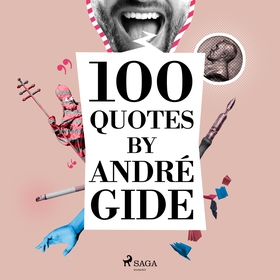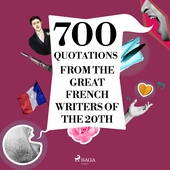
Lägg till önskelistan
Gratis smakprov
- Spara till biblioteket
- Lyssna på smakprov
100 Quotes by André Gide ljudbok
Pris
69 kr
Frenchman André Paul Guillaume Gide (1869 – 1951), was an author and winner of the 1947 Nobel Prize in Literature. He published over fifty books, including 'Les Nourritures terrestres' (1897) ('Fruits of the Earth'), ‘Les Caves du Vatican’ (1914) ('Lafcadio’s Adventures'), ‘La Porte étroite’ (1909) ('Strait is the Gate'), 'La Symphonie pastorale' (1919), and the experimental ‘Les Faux Monnayeurs’ (1926). However, he is best known for ‘Corydon’ (1911), which he believed to be his most importan...
Ljudbok
69 kr
Pris
Förlag
Saga Egmont
Utgiven
9 Oktober 2022
Längd
0:18
Genrer
Humor, Skönlitteratur
Språk
English
Format
mp3
Kopieringsskydd
Vattenmärkt
ISBN
9782821116283
Frenchman André Paul Guillaume Gide (1869 – 1951), was an author and winner of the 1947 Nobel Prize in Literature. He published over fifty books, including 'Les Nourritures terrestres' (1897) ('Fruits of the Earth'), ‘Les Caves du Vatican’ (1914) ('Lafcadio’s Adventures'), ‘La Porte étroite’ (1909) ('Strait is the Gate'), 'La Symphonie pastorale' (1919), and the experimental ‘Les Faux Monnayeurs’ (1926). However, he is best known for ‘Corydon’ (1911), which he believed to be his most important work.
This collection contains 100 of André Gide’s most celebrated quotes.
André Paul Guillaume Gide (1869–1951) was a French author and winner of the 1947 Nobel Prize in Literature. Described as 'France's greatest contemporary man of letters,' Gide was known for his fiction and autobiographical works. He published over fifty books, including 'Les Nourritures terrestres' (1897) ('Fruits of the Earth'), ‘Les Caves du Vatican’ (1914) ('Lafcadio’s Adventures'), ‘La Porte étroite’ (1909) ('Strait is the Gate'), 'La Symphonie pastorale' (1919), and the experimental ‘Les Faux Monnayeurs’ (1926) ('The Counterfeiters'). However, the Frenchman claimed ‘Corydon’ (1911), was his most important work. In it, he used evidence from naturalists, historians, poets, and philosophers to back up his belief that homosexuality was not ‘unnatural’, arguing it was more natural than exclusive heterosexuality, which he believed to be a union created by society.





